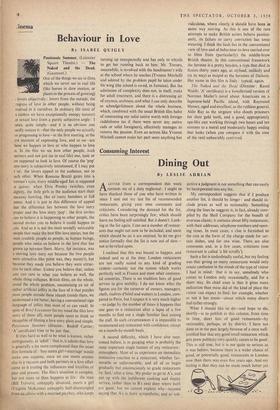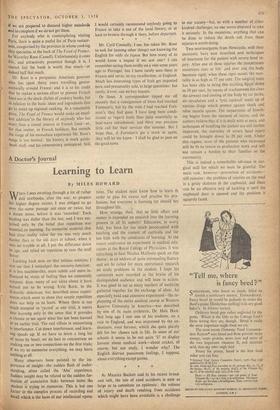Consuming Interest
Dining Out
By LESLIE ADRIAN ALETTER from a correspondent this week reminds me of a duty neglected: I ought to have thanked those of you who have written in since I sent out my last list of recommended restaurants, giving your own comments and criticisms. Considering the demand for the list, critics have been surprisingly few; which should leave me feeling self-satisfied. But it doesn't. Look- ing at the list again, can see a number of restaur- ants that ought not now to be included; and some which should be on it are omitted. So let me give notice formally that the list is now out of date— not to be relied upon.
I realised that this was bound to happen, and indeed said so at the time. London restaurants are not really suited to any kind of grading system—certainly not the system which works perfectly well in France and most other continen- tal countries. There is no tradition here of good service to give stability. I do not know what the figures are for the turnover of owners, managers, chefs, maitres d'hôtel and waiters in London, com- pared to Paris, but I suspect it is very much higher —to judge by the number of times it happens that one goes to a restaurant after a lapse of a few months to find not a single 'familiar face among the staff. In such circumstances it is impossible to recommend any restaurant with confidence, except on a month-by-month basis.
A second difficulty, which I have also men- tioned before, is in gauging what is probably the most important single feature of any restaurant : atmosphere. Most of us experience an immediate instinctive reaction to a restaurant, whether fav- ourable or unfavourable; and all of us begin gradually but unconsciously to grade restaurants by 'feel,' after a time. We prefer to go to A's, and put up with the indifferent cooking and sloppy service, rather than to B's next door where both are good; but we cannot explain why—beyond saying that A's is more sympathetic; and so sub- jective a judgment is not something that can easily be incorporated into any list.
My correspondent suggests that if I produce another list, it should be longer : and should in- clude prices as well as nationality. Something along the lines he suggests is, in fact, already com- piled by the Shell Company for the benefit of overseas clients; it contains about fifty restaurants, with their addresses, telephone numbers and open- ing times. In most cases, a clue is furnished to the cost in the form of the charge made for cer- tain dishes, and for one wine. There are also comments and, in a few cases, criticisms (one restaurant is called 'a bit scruffy').
Such a list is undoubtedly useful, but my feeling was that giving so many restaurants would only create confusion in the minds of the type of visitor I had in mind : that is to say, somebody who comes to London only occasionally, and for a short stay. lts chief asset is that it gives more indication than mine did of the kind of place the visitor can expect to find; for example, whether or not it has music—about which many diners feel rather strongly.
What I should like to do—and hope to do, shortly—is to publish in this column, from time to time, short lists of good restaurants—by nationality, perhaps, or by district. I have not done so in the past largely because of a once well- justified fear that any good small restaurant which gets press publicity.very quickly ceases to be good. This is still true, but it is not quite so serious as it was before; because there is a wider choice of good, or potentially good, restaurants in London now than there was even five years ago. And my feeling is that they can be made much better yet if we are prepared to demand higher standards and to complain if we do not get them.
For anybody who is contemplating visiting Paris, there is quite a useful list of Paris restaur- ants, categorised by the province in whose cooking they specialise, at the back of The Food of France, by Waverley Root (Cassell). Unfortunately it costs 63s., and attractively presented though it is, I cannot feel the book is worth that much—or indeed half that much.
Mr. Root is a peripatetic American gourmet who has spent thirty years travelling gastro- nomically around France; and it is to his credit that he makes a• serious effort to present French food not in the stock clichds of cookery books, but in relation to the basic ideas and ingredients that go to make up regional cooking. At a reasonable price, The Food of France would make an excel- lent addition• to the library of anybody who has more than a casual interest in French food—or, for that matter, in 'French holidays. But outside the range of his immediate exPerience Mr. Root's range is too limited : his history is stock guide- book stuff, and his commentary uninspired. Still, I would certainly recommend anybody going to France to take it out of the local library, or at least to browse through it there, before departure.
* * Mr. Cyril Connolly, I see, has taken Mr. Root to task for (among other things) not knowing the English for ne/Ic du Japon. But how many of us would know a loquat if we saw one? I can remember eatingsthem avidly on a visit some yearg ago to Portugal; but I have rarely seen them in France and never, to my recollection, in England. Much less interesting types of fruit get imported here, and presumably sold, in large quantities : but rarely, if ever, can we buy loquats.
Or limes. A correspondent tipped me' off recently that a consignment of limes had reached Fortnum's; but by the time' I had reached Fort- num's, they had gone. have long been condi- tioned to regard fresh lime Mae essentially as heat-wave refreshMent, and there was precious little call for their services this summer. But I hope that, if Fortnum's get a stock in again, they will let me know : 1 shall be glad to pass on the good news.



















































 Previous page
Previous page